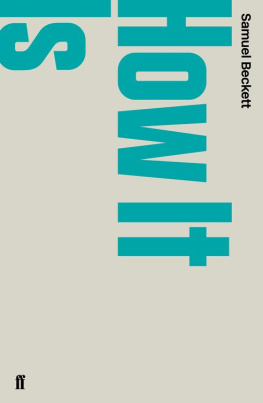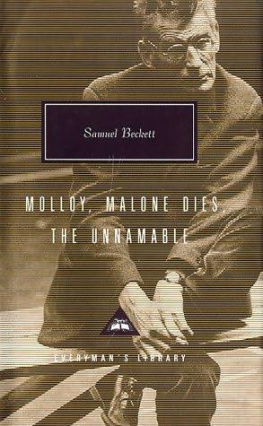Beckett Samuel - Beckett after Wittgenstein
Here you can read online Beckett Samuel - Beckett after Wittgenstein full text of the book (entire story) in english for free. Download pdf and epub, get meaning, cover and reviews about this ebook. City: Evanston;Illinois, year: 2015;2016, publisher: Northwestern University Press, genre: Detective and thriller. Description of the work, (preface) as well as reviews are available. Best literature library LitArk.com created for fans of good reading and offers a wide selection of genres:
Romance novel
Science fiction
Adventure
Detective
Science
History
Home and family
Prose
Art
Politics
Computer
Non-fiction
Religion
Business
Children
Humor
Choose a favorite category and find really read worthwhile books. Enjoy immersion in the world of imagination, feel the emotions of the characters or learn something new for yourself, make an fascinating discovery.

- Book:Beckett after Wittgenstein
- Author:
- Publisher:Northwestern University Press
- Genre:
- Year:2015;2016
- City:Evanston;Illinois
- Rating:4 / 5
- Favourites:Add to favourites
- Your mark:
- 80
- 1
- 2
- 3
- 4
- 5
Beckett after Wittgenstein: summary, description and annotation
We offer to read an annotation, description, summary or preface (depends on what the author of the book "Beckett after Wittgenstein" wrote himself). If you haven't found the necessary information about the book — write in the comments, we will try to find it.
Beckett after Wittgenstein — read online for free the complete book (whole text) full work
Below is the text of the book, divided by pages. System saving the place of the last page read, allows you to conveniently read the book "Beckett after Wittgenstein" online for free, without having to search again every time where you left off. Put a bookmark, and you can go to the page where you finished reading at any time.
Font size:
Interval:
Bookmark:
Andre Furlani

NORTHWESTERN UNIVERSITY PRESS
EVANSTON, ILLINOIS
Northwestern University Press
www.nupress.northwestern.edu
Copyright 2015 by Northwestern University Press. Published 2015. All rights reserved.
The author gratefully acknowledges the collaboration of David Sherman, David Rudrum, Mark Nixon, Brian Jones, Todd Hopkins, Anne Gendler, Suzanne Buffam, and the anonymous readers at Northwestern University Press, as well as the support of the Social Sciences and Humanities Research Council of Canada.
Earlier versions of sections appeared in PMLA 127:1, Modernism/Modernity 22:3, Philosophy and Literature 39:2, and Literatures in English: New Ethical, Cultural and Transnational Perspectives.
Library of Congress Cataloging-in-Publication Data
Furlani, Andre, 1961 author.
Beckett after Wittgenstein / Andre Furlani.
pages cm
Includes bibliographical references and index.
ISBN 978-0-8101-3216-0 (pbk. : alk. paper) ISBN 978-0-8101-3217-7 (cloth : alk. paper) ISBN 978-0-8101-3218-4 (ebook)
1. Beckett, Samuel, 19061989Criticism and interpretation. 2. Wittgenstein, Ludwig, 18891951Influence. I. Title.
PR6003.E282Z66548 2015
848.91409dc23
2015031414
A note to the reader: This e-book has been produced to offer maximum consistency across all supported e-readers. However, e-reading technologies vary, and text display can also change dramatically depending on user choices. Therefore, you occasionally may encounter small discrepancies from the print edition, especially with respect to indents, fonts, symbols, and line breaks. Furthermore, some features of the print edition, such as photographs, may be missing due to permissions restrictions
For the Furlanguays: Noah, Ezra, Emil, and Darragh
Who today would presume to claim that he is at home with the nature of poetry as well as with the nature of thinking and, in addition, strong enough to bring the nature of the two into the most extreme discord and so establish their concord?
Martin Heidegger, What Are Poets For?
Whereof one cannot speak, thereof one must be silent.
Wittgenstein, Tractatus
I shall have to speak of things of which I cannot speak...
Beckett, The Unnamable
Words fail us. Why then dont we introduce more? What would the case have to be for us to be able to do so?
Wittgenstein, Philosophical Investigations
Is not that so, Willie, that even words fail, at times? (Pause. Back front.) What is one to do then, until they come again?
Beckett, Happy Days
Das Rtsel gibt es nicht. (There is no riddle.)
Wittgenstein, Tractatus
Von Rtseln und Lsungen also kein Gedanke. (So no thought of riddles and solutions.)
Beckett, Disjecta
If I had planned it, I should never have made the sun at all. See! How beautiful! The sun is too bright and too hot. And if there were only the moon there would be no reading and writing.
Wittgenstein, to O. K. Bouwsma, Wittgenstein Conversations 19491951
If there were only darkness, all would be clear. It is because there is not only darkness but also light that our situation is inexplicable.
Beckett, to Tom Driver, Columbia University Forum
I want to play chess, and a man gives the white king a paper crown, leaving the use of the piece unaltered, but telling me that the crown has a meaning to him in the game, which he cant express by rules. I say, as long as it doesnt alter the use of the piece, it hasnt what I call a meaning.
Wittgenstein, The Blue and Brown Notebooks
At this point Mr. Endon, without as much as jadoube, turned his King and Queens Rook upside down, in which position they remained for the rest of the game.
Beckett, Murphy
If I listened to the words of my mouth, I might say that someone else was speaking out of my mouth.
Wittgenstein, Philosophical Investigations
Stream of words... in her ear... practically in her ear... not catching the half... not the quarter... no idea what shes saying!
Beckett, Not I
Always descend from the barren heights of cleverness into the green valleys of foolishness.
Wittgenstein, Miscellaneous Remarks
Il faut retrouver lignorance. (Get back to ignorance.)
Beckett, to Anne Atik, How It Was
If I talk or write, there is, I assume, a system of impulses going out from my brain and correlated with my spoken or written thoughts. But why should the system continue further in the central direction? Why should this order not emerge, so to speak, from chaos?
Wittgenstein, Zettel
There is an end to the temptation of light, its polite scorching & consolations... The real consciousness is the chaos, a grey commotion of mind, with no premises or conclusions or problems or solutions or cases or judgments.
Beckett, letter to Mary Manning Howe
For it is no longer enough to be able to play the game well, rather the question again and again is: is this game now worth playing at all and what is the right game?
Wittgenstein, Miscellaneous Remarks
Meto play? (Pause. Wearily.) Old endgame lost of old, play and lose and have done with losing.
Beckett, Endgame
The thinking, presenting subject does not exist... The subject belongs not to the world but is a boundary of the world.
Wittgenstein, Tractatus
I know its not I, thats all I know, I say I, knowing its not I...
Beckett, The Unnamable
The work of art does not want to convey anythingelse, simply itself.
Wittgenstein, Miscellaneous Remarks
Dont ask me for any meaning in the thing; it just is what it is.
Beckett, while rehearsing Happy Days
Introduction
Chapter 1
Chapter 2
Chapter 3
Chapter 4
Chapter 5
Chapter 6
Chapter 7
Chapter 8
Chapter 9
Chapter 10
Chapter 11
Conclusion
When someone promises from one day to the other, I will visit you tomorrow, is he saying the same thing every day, or every day something different? (Philosophical Investigations 226). profound situatedness of speech.
En attendant Godot premiered within a few months of the publication of Philosophische Untersuchungen in 1953, and like the latter the former had been largely completed almost four years earlier. These peculiarly complementary explorations of language rapidly entered the canon without becoming fully assimilated to it, and they remain objects no less of vehement aversion than of veneration. The play and the treatise have been accused of attempting to deal the coup de grce to their respective genres. Indeed, the accusation has been leveled at the authors entire oeuvres.
That Beckett would proceed to assemble a substantial collection of books by and about Wittgenstein should come as no surprise, though this interest has largely been discounted. Becketts unsparing exhibitions of petrified language-games coincides with Wittgensteins examination of the near-imperceptible waywardness of language and its collusion in the perpetuation of misleading a priori concepts. And while the ground of being is ungrounded, the attention of both writers falls equally on how that ground nevertheless gets traversed.
Font size:
Interval:
Bookmark:
Similar books «Beckett after Wittgenstein»
Look at similar books to Beckett after Wittgenstein. We have selected literature similar in name and meaning in the hope of providing readers with more options to find new, interesting, not yet read works.
Discussion, reviews of the book Beckett after Wittgenstein and just readers' own opinions. Leave your comments, write what you think about the work, its meaning or the main characters. Specify what exactly you liked and what you didn't like, and why you think so.

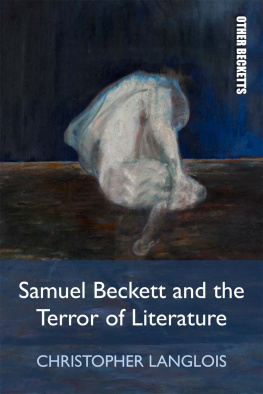
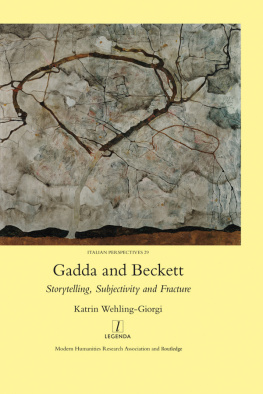
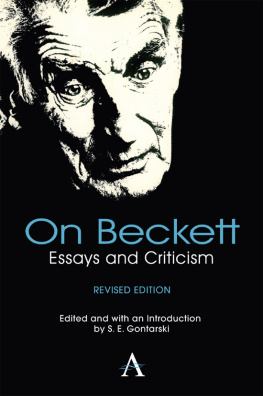
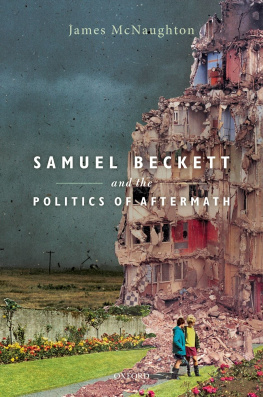
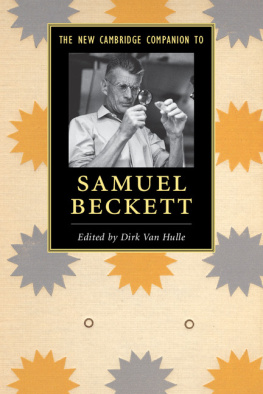
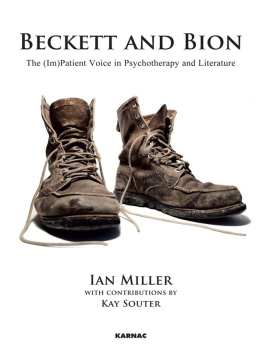
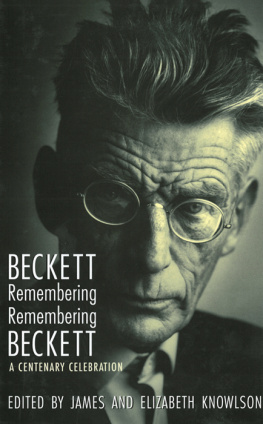
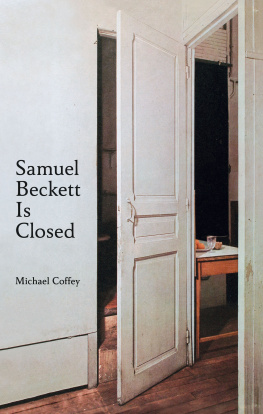
![Samuel Beckett [Samuel Beckett] - The Complete Dramatic Works](/uploads/posts/book/72751/thumbs/samuel-beckett-samuel-beckett-the-complete.jpg)
